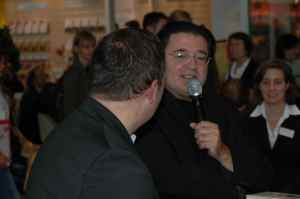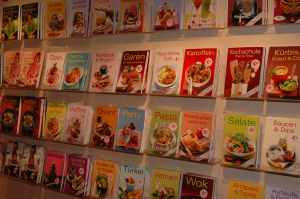
The Fair is business, but it is also a celebration of the convergence two creative impulses, that of the book printers and designers, and that of the authors themselves. A children’s book by a South Korean authoress catches my eye, a tale about a girl with a fox on her head. A simple tale, not trying to be funny, just delightfully illustrated. Non-book articles are also a source of genuine creativity, but Hall 4.0 is just out of my two-day range, so I can only gaze briefly. The business of bookselling, too, requires genuine skill. Many publishers still have the courage and backbone to do less popular projects, Michael Jackson thus finds a spot next to a bio of Hitler-opponent Countess Marion Donhöff (biographies are big anyway, I suspect we are always curious about what other people are doing). On that score, the Book Fair never seems to change. But each year, it has a few big issues to confront
Off the books: liber digitalis
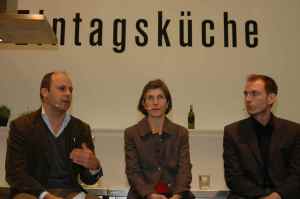
The big buzz, of course, is the inexorable progress of the digital soldier ants through the old, old market structures of the printing industry. Its all about eBooks, iBooks, Web-based books and Internet-based business models, and the biggest elephant in the room: the Kindle, born on the 19th of October. A small amount of space, about 2000 square feet (about 200 square meters) is devoted to “Books & Bytes.” It exhibits several possibilities for reading electronic books, but none yet really replicate “the book feeling.” You can’t thumb pages quickly (yet), or find a page serendipitously. And if they fall over the side of a bed, for example, they may well break. Vodafone is promising to send end-users novels on their mobile phones (I’ll try and then report), and three experts in the field of cooking – there we go again – discussed the sheer brilliance of having recipes with great pics beamed to your iPhone. “You can take it along with you when shopping…” one of them says. Next innovation down this line: the plastic cover to protect the device from spatter. Whatever: I suspect that next year, Amazon and Google, once odd fellows, now giant players, will probably own half of Hall 3.0… And watch for the next development promised by the Wi-Fi Alliance (Intel, Apple, Cisco are the main culprits) from Silicon Valley: Wi-Fi Direct. This system will, if I understand it correctly, piggyback Wi-Fi from one enabled device to the other, no need for Bluetooth, no need for Wi-Fi in some cases, no fuss, no muss, and a lot of electronic garbage from the last generation of innovative junk.

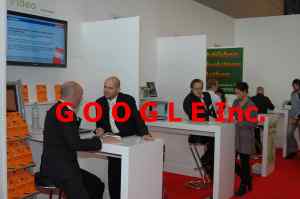
The hellish vision: A digital content aggregator puts together novels and fact books that can be downloaded onto books with Wii-like pages that replicate turning. No fuss, no muss with those greedy authors, sourpuss editors, bean-counting lawyers and grumpy literary critics. The lovers of real books will simply become the savages in the year X of Our Google. And that is the point made by Dr. Christian Sprang, legal adviser at the Stock Exchange Association of the German Book Trade at a debate on the thrid day of the Fair. He wants rights holders to have an opt-in option, not just the opt-out one. And Professor Roland Reuss simply says Google has broken the law by digitizing books without permission.
Interlude
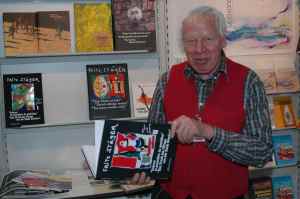
Niches. The last refuge of the real book in the future? The Book Fair is full of them, and some still smell of printer’s ink, of hot presses, of red wine and even a touch of sulphur. Meet Joseph E. Hanhart of Editions Heuwinkel from Carouge (by Geneva), Switzerland. His bright blue eyes are full of humor, he still holds books in a firm yet loving manner. He publishes art books in varying sizes, each done with great care. The program also includes books on yoga and on Switzerland. He feels the market does need the diversity and he is optimistic. “In nature, you have brush and you have tall, visible trees,” he points out, “and without the grasses, the weeds and all that stuff, those tall trees could not survive.” But nature and human nature are two different shoes as they say in German. We will eat up our entire planet, suck out its entrails and raze its forests just to get hamburgers cheaply and fuel to run our cars.
And so we get onto talking about bigger things. Hanhart is a genial storyteller in at least three languages. He suddenly mentions the 450th anniversary of the University of Geneva, which was founded by Calvin. One of the speakers was Stephen Hawking. Someone in the audience asked what god was doing before his seven days of heavy labor. “Preparing hell for the likes of you,” answered Hawking. Asymmetrical juxtapositions replacing dialectics.
Please check Part III: Chinese Checkers

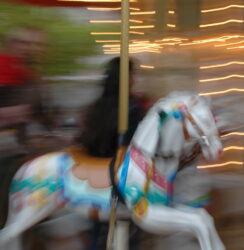

 and iPhones and other toys and the problems we encountered. Hers seemed to be vaguely related to too much work. Mine with editors not bothering to answer their emails. “We are overworked, I sometimes don’t even open my mails, there are so many,” she retorted, tersely. Well, I think, how much would it cost to hire someone to do it, lord knows, there are enough intelligent and capable people out of work right now. But instead, I point out that Hermann Hesse, besides all the novels and stories and poems, also wrote 35,000 letters on an old black typewriter. She looks at me: “I hate Hesse,” she says, and ends the conversation by staring intently at her manuscripts.
and iPhones and other toys and the problems we encountered. Hers seemed to be vaguely related to too much work. Mine with editors not bothering to answer their emails. “We are overworked, I sometimes don’t even open my mails, there are so many,” she retorted, tersely. Well, I think, how much would it cost to hire someone to do it, lord knows, there are enough intelligent and capable people out of work right now. But instead, I point out that Hermann Hesse, besides all the novels and stories and poems, also wrote 35,000 letters on an old black typewriter. She looks at me: “I hate Hesse,” she says, and ends the conversation by staring intently at her manuscripts.
